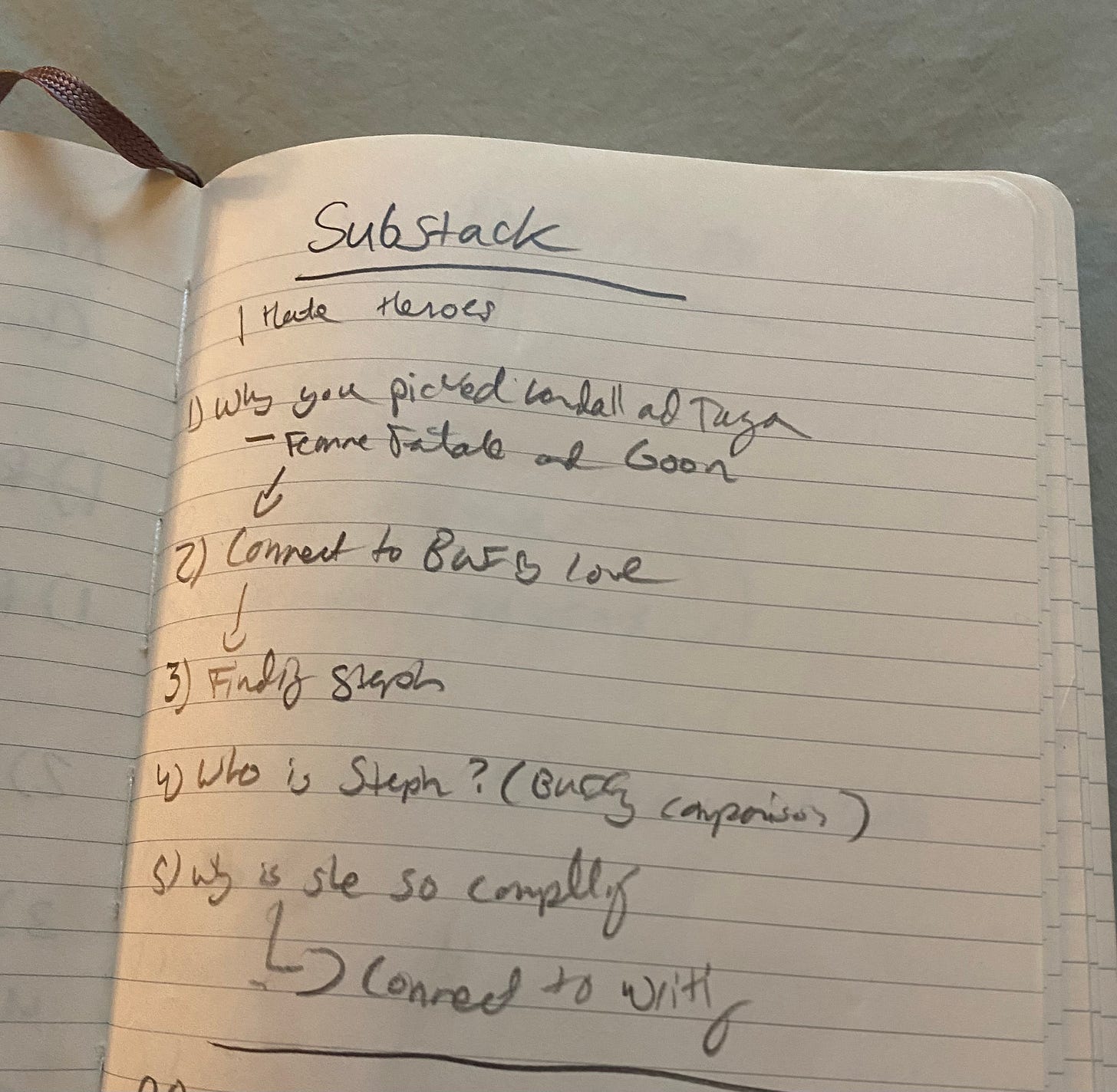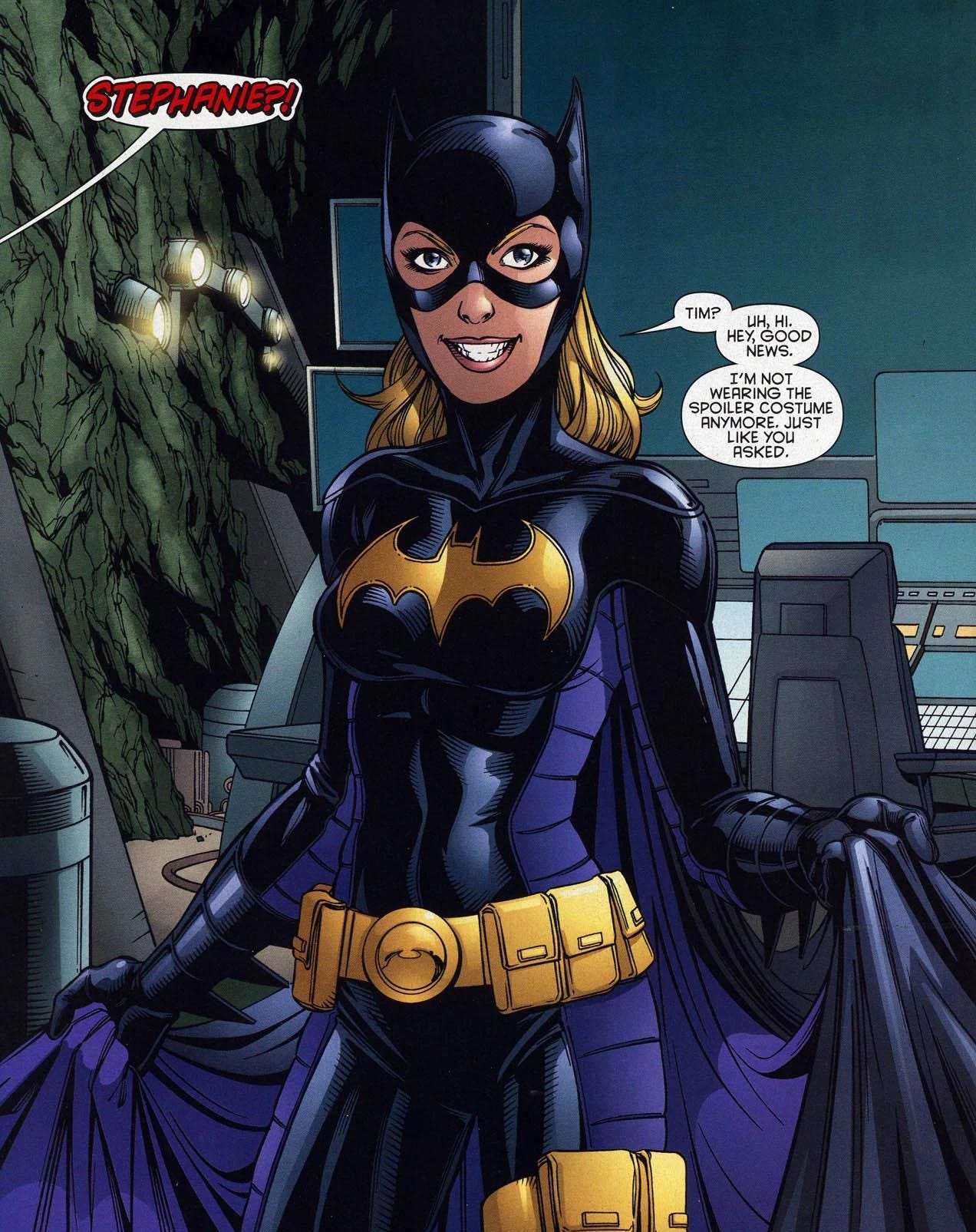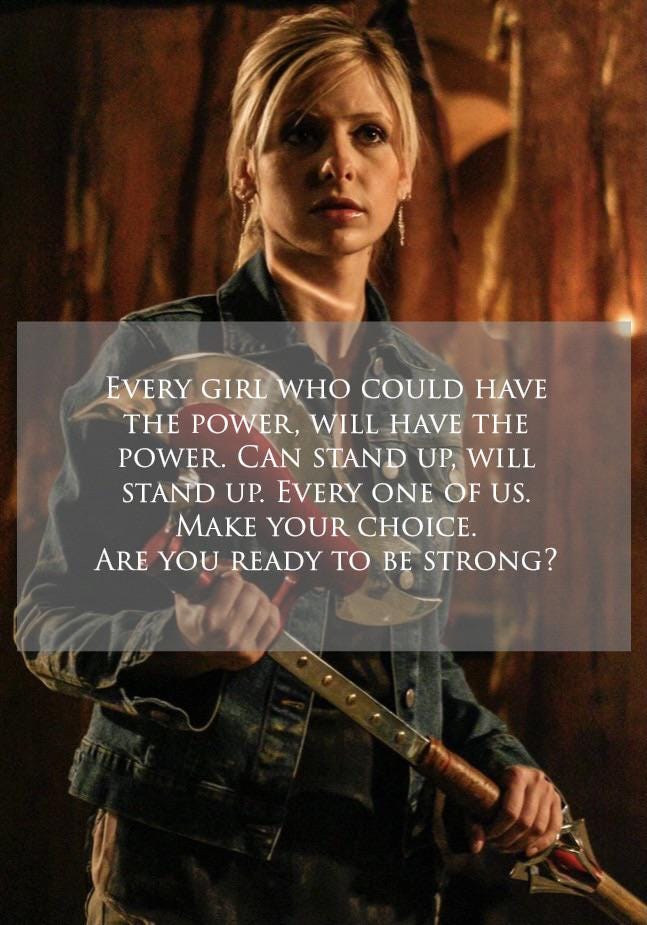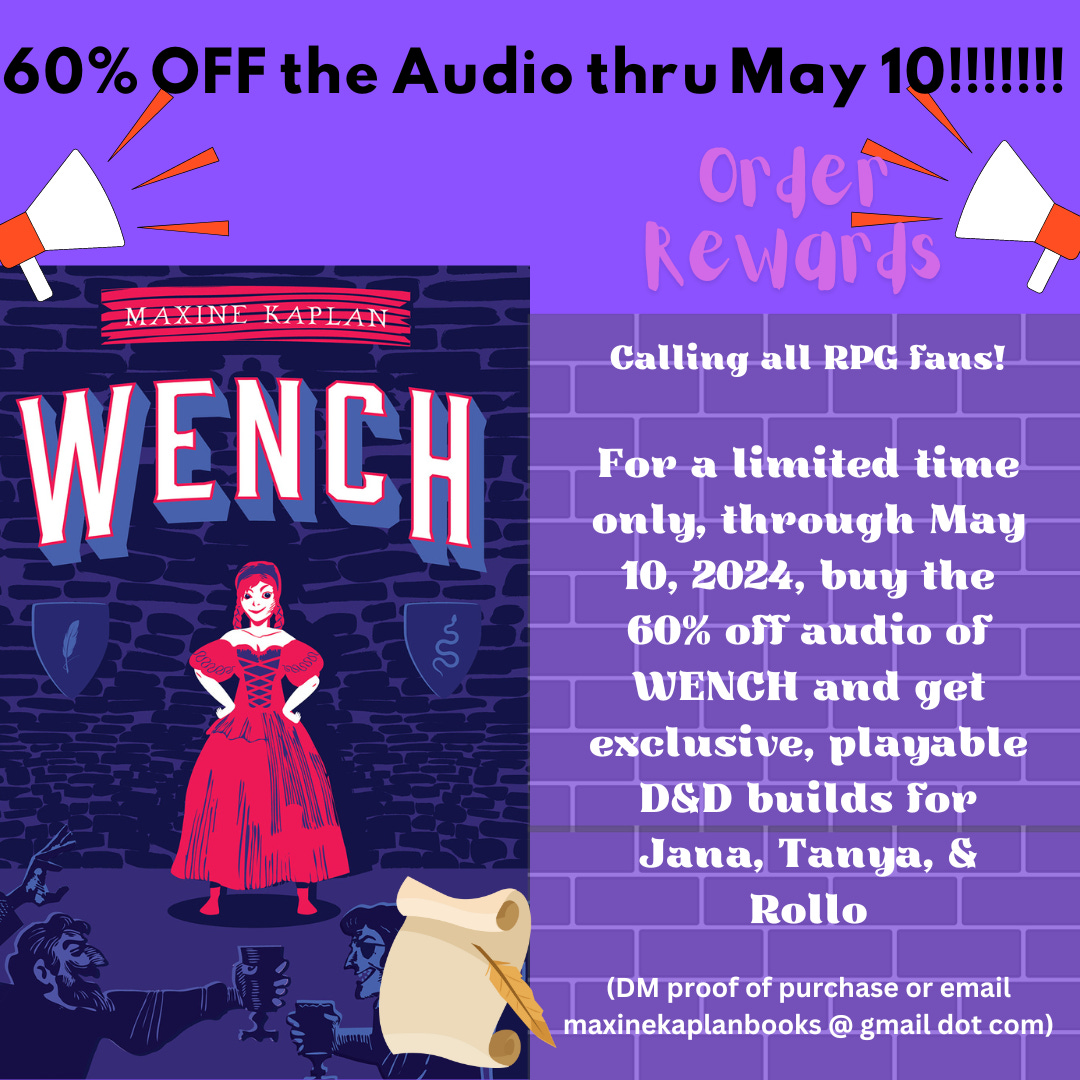So you want to be a superhero...
This isn’t the essay I meant to write today. Not exactly.
The essay I meant to write, the one I have an outline written down for, longhand, in my notebook, was a hagiography of DC comics character Stephanie Brown, my favorite deepish cut of the Batman mythos—because there’s a lot to unpack about Steph. Steph is a perfect lens through which to talk about imposter syndrome, and self-determination in the face of imposter syndrome. Steph is also a perfect prism through which to engage with ambiguity and conflicts with assigned roles, especially around gender; about how it feels when you know you have something to contribute, but you—the way you act, the way you move, the way you think—just aren’t quite right; “Sorry,” says the casting director of life. “We’re looking for a different type.”
I always describe Stephanie Brown this way: imagine if Buffy really, really wanted to be the slayer, but everyone kept telling her she wasn’t good enough. This essay was going to be about why she inspires me to avoid writing about “heroes.”
A quick and dirty (and biased) primer on the fictional bio of Stephanie Brown:
Stephanie’s father was a back-bencher Gotham villain called the Cluemaster. He went to jail when Steph was a kid, and when he was released in her teenage years, he swore to his daughter that he was rehabilitated. He lied, returning to crime immediately, and a lot less sloppily than before. Steph finds out about it and resolves, on her own, to stop him. She procures a motorcycle, a blue mask, and an alter-ego, the Spoiler. She’s a superhero of one, with one goal: a goal she succeeds in, coming across the skeptical Batman as she does. Batman tells her to hang up her cowl and stop training: she’s not superhero material.
When Tim Drake briefly stops being Robin (coinciding with him getting help for his depression, courtesy of his girlfriend, you guessed it, Steph Brown), she makes her own Robin costume, sneaks her way into the Batcave (a totally easy thing to do, right?), and presents herself to Batman as his new Robin. He doesn’t think she’s good enough to replace Tim. But, in a lurch, he reluctantly agrees. He doesn’t share all his plans with her and fires her immediately for disobeying him in the field. When she tries to prove her worth, working off the incomplete information Batman deigned to give her, it backfires. She’s caught and tortured by Black Mask. She escapes and seems to die. I say “seems to” because yet someone else decided that Steph was a bad role model: Dr. Leslie Thompkins fakes her death to discourage more Stephanies from wanting to fight for their city, when really, they should leave it to the big boy vigilantes.
After Steph re-emerges, still a teenager, and Batman disappears (see the Batman: RIP storyline, we don’t have time here), Barbara Gordon, now acting as Oracle, offers to train Steph to be Batgirl. Steph eagerly agrees, working successfully with Oracle and the Birds of Prey through what was truly one of the best regular books of late 2000s…until DC Comics decided to retcon her out of existence, miraculously curing Barbara’s paralysis, ending her hugely significant Oracle arc, and reinstating Babs as Batgirl. For…reasons? I guess?
Stephanie wasn’t trained from childhood by either Batman or a police commissioner, but she’s no slouch, even as, and I can’t emphasize this enough, a teenager. She can fight, using her own, unpredictable style. She can detect the fuck out of things. Even Batman praises her intuition. And yet, Babs—serious and discreet, with an impeccable crime-fighting pedigree—was scouted by Batman, then protected, respected; cultivated. Steph was dismissed out of hand. Why?
Steph is blonde. Steph is pretty. Steph flirts. Steph is bubbly and girly. Steph is unorthodox—creative and spontaneous, even impulsive. In other words, Steph is wrong for the part.
But she’s good at what she does.
I was going to use Steph to talk about imposter syndrome in writing and in working life in general. I was going to use her to talk about respectability politics and misogyny. I was going to use her to talk about the kinds of characters I want to write. And I think it would be a good essay.
But then I had an experience on social media this week and decided to make it personal.
I’m sure this is a bad thing to admit on a Substack that I’m trying to get more people to read, but I am by nature very bad at being what social media wants me to be. I don’t know how to be what social media wants me to be. Despite being a very smart person who loves and is skilled at research, I don’t even know how to learn what social media wants me to be. I’m not polished on camera, I have no visual design skills, and I don’t have the social skills to understand why people are responding to the reels and TikToks that they are responding to (ask me about my nonverbal learning disorder someday—I’m serious, anyone can and should).
I’m a very good writer. I’ll even say I’m a very good novelist. But I don’t know if I’m a good author. It’s not enough.
The industry right now is telling me that in order to be an “author” I have to have a well-lit space in front of a nicely organized (or charmingly disorganized) bookshelf and an ability to connect with strangers on camera—not just the ability; I have to enjoy doing it. They’ll know, whisper all the online gurus, and even my friends. Your social media will fail unless it’s authentic.
I could embark on a deep-dive study and ape the styles. That’s one of my superpowers, although it’s a uniquely useless one when trying to make creative work: I can ape the way other people write. I’d be a great speechwriter or ghostwriter but the average Booktok viewer would instantly know I was full of shit. I could talk about the things I’m interested in, but I don’t think the things I’m interested in sell books.
The experience I had this week on social media was this. I posted a resource for people wanting to donate to families trying to escape Gaza. I had been wanting to do more—wanting to run a bookish giveaway, like the great Sim Kern or Becky Albertalli or many, many others—but I didn’t think I had enough reach in my social media to get any takers, so I posted a graphic directing people to Operation Olive Branch.
I was immediately flooded, with more likes, comments, and direct messages than I have ever had on any post…mostly people asking me to help them contact people with more online reach than me. Understandably! And it recast my failures in this social media as not only affecting my ability to be an author in 2024 but also to be an activist. At least, an effective one.
I’m a skilled and experienced organizer. I volunteer. I donate money I don’t really have to spare. It’s not enough.
I’m not right for this part.
And so, I come back to the lessons of Stephanie Brown. I’m writing this as much for my benefit as any other reason, to remind myself. So, to use the social media parlance of our times: I don’t know who needs to hear this but…
We can’t stop writing because somebody doesn’t like our costume. We can switch costumes when costumes don’t work for us anymore. We can’t stop working for changes we care about enacting because the visible superheroes of the movement work differently, using different skills and qualities, than we do. We must do the work that we can do.
We pivot: Spoiler one day, Robin the next. We keep coming back, like Stephanie, who DC can’t quite seem to kill off entirely (see Becky Cloonan’s wonderful 2022 Batgirls run). Being myself, I must consistently remind myself, does not mean being ineffective. After all, I still remember Steph as my favorite. Someone is reading you, someone is feeling the effects of what you can do—as you. I said to my therapist last year that I wanted to institute a new metric for success: if my writing feels like it could only have come from me, nobody else, it’s a success, regardless of if or how it sells. I think I should probably listen to myself.
Even Buffy ended with the edict that everyone who has potential to be a slayer, is a slayer.
But I don’t want to be a slayer, not anymore. I want to be the Spoiler.
And as a sop to the social media gods, here’s a plug for a promotional giveaway for the audiobook of Wench, my 2021 novel, 60 percent off through May 10, 2024, that just so happens to be about exactly this question of who gets to be important, and which talents and qualities we allow to be heroic. It’s also a funny, queer fantasy adventure with a stealth climate fiction agenda, an ice queen, a volcano witch cult, and a mean psychic horse.
Happy Monday! Stay sane out there.







